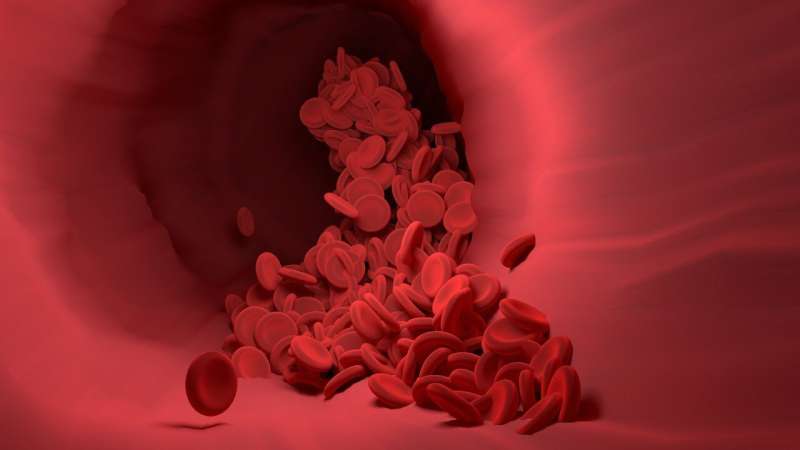Scientists develop synthetic blood-thinner that doesn't cause bleeding side-effects

Patients who suffer from thrombosis, pulmonary embolism or stroke are usually administered drugs that help their blood flow more smoothly. Anticoagulants, or "blood thinners" as they are popularly known, can keep blood clots from forming or getting bigger, and can therefore help with recovery from heart defects or prevent further complications.
But there is a catch: Blood thinners work by blocking enzymes that help to stop bleeding after an injury. Because of this, virtually every blood thinner available today can lead to serious, and even life-threatening bleeding following an injury.
The problem remained unresolved until a few years ago, when researchers conducted a study of mice genetically modified to be deficient in an enzyme that normally helps blood clot. The enzyme is called coagulation factor XII (FXII), and the mice without the enzyme had a highly reduced risk of thrombosis without bleeding side-effects. The discovery triggered a race for FXII inhibitors.
The Laboratory of Therapeutic Proteins and Peptides of Professor Christian Heinis at EPFL has now developed the first synthetic inhibitor of FXII. The inhibitor has high potency, high selectivity, and is highly stable, with a plasma half-life of over 120 hours. Published in Nature Communications, the study is the result of an extensive collaboration with three other labs in Switzerland and the US.
"The FXII inhibitor is a variation of a cyclic peptide that we identified in a pool of more than a billion different peptides, using a technique named phage display," says Heinis. The researchers then improved the inhibitor by painstakingly replacing several of its natural amino acids with synthetic ones. "This wasn't a quick task; it took over six year and two generations of Ph.D. students and post-docs to complete."
With a potent FXII inhibitor in hand, Heinis's group wanted to evaluate it in actual disease models. To do this, they teamed up with experts in blood and disease-modeling at the University Hospital of Bern (Inselspital) and the University of Bern.
Working with the group of Professor Anne Angellillo-Scherrer (Inselspital), they showed that the inhibitor efficiently blocks coagulation in a thrombosis model without increasing the bleeding risk. Then they assessed the inhibitor's pharmacokinetic properties with the group of Professor Robert Rieben (University of Bern). "Our collaboration found that it is possible to achieve bleeding-free anti-coagulation with a synthetic inhibitor," says Heinis.
Artificial lungs
"The new FXII inhibitor is a promising candidate for safe thromboprotection in artificial lungs, which are used to bridge the time between lung failure and lung transplantation," says Heinis. "In these devices, contact of blood proteins with artificial surfaces such as the membrane of the oxygenator or tubing can cause blood clotting." Known as 'contact activation', this can lead to severe complications or even death and limits the use of artificial lungs for longer than a few days or weeks.
To test the effectiveness of the FXII inhibitor in artificial lungs, Heinis's group turned to Professor Keith Cook at Carnegie Mellon University (US), an expert for artificial lung system engineering. Cook's group tested the inhibitor in an artificial lung model, and found that it efficiently reduced blood clotting, all without any bleeding side-effects.
The only problem is that the inhibitor has a relatively short retention time in the body: it's too small and the kidneys would filter it out. In the context of artificial lungs, this would mean constant infusion, since suppressing blood clotting for several days, weeks or months requires a long circulation time.
But Heinis is optimistic: "We're fixing this—we're currently engineering variants of the FXII inhibitor with a longer retention time."
More information: Jonas Wilbs et al. Cyclic peptide FXII inhibitor provides safe anticoagulation in a thrombosis model and in artificial lungs, Nature Communications (2020). DOI: 10.1038/s41467-020-17648-w


















